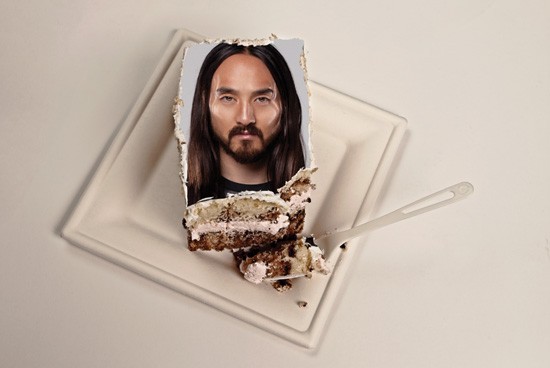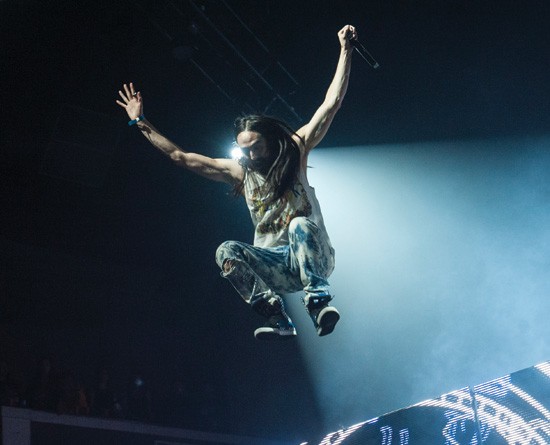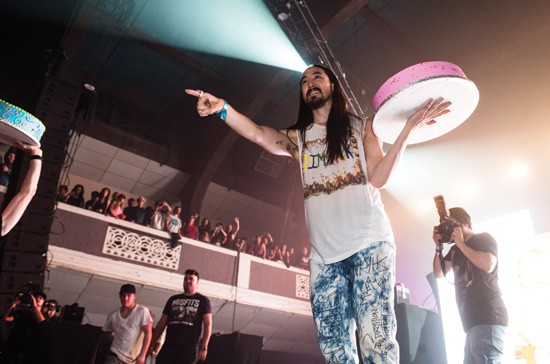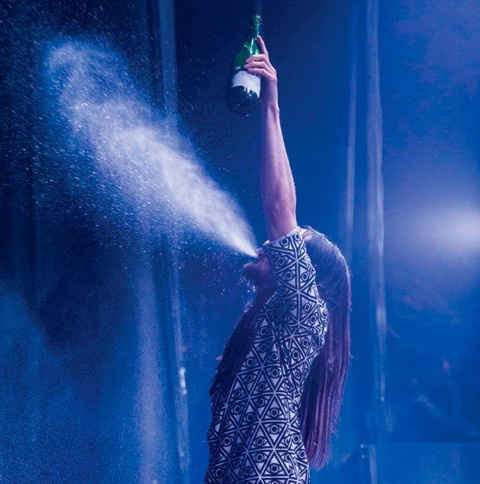
Steve Aoki stands atop a table in front of his DJ equipment in a pair of black board shorts with large X's, reminiscent of his straight-edge hardcore teen years; black sneakers with a leopard print; and a Dim Mak T-shirt. It's after dark on Aug. 29 at Del Mar racetrack. Thousands of fans throw their hands up, neon glow-stick-waving acolytes covered in fluorescent rave kandi and not much else. Confetti rains down from the sky. CO2 cannons belch clouds of high-velocity cold air.
An Asian Jesus look-alike with his wire-thin frame, long, stringy hair and goatee, Aoki is about to baptize the crowd the only way he knows how–with a Betty Crocker bomb covered in white icing. His muscles tense as he prepares to fling a 2-foot-long sheet cake into the screaming masses. Dozens of hysterical teens and twentysomethings proudly hoist up signs that say, “Cake Us,” while showing off their Dim Mak paraphernalia, waving them in the air while Aoki bobs his head and shuffles to the beat.
The racetrack seems like an unlikely venue for a super-star DJ used to playing the massive main stages of EDM festivals, but in some ways, it couldn't be more apt. In the world of touring multimillionaire DJs, this dude moves fast.
]
Del Mar is just one of the six shows the 36-year-old producer played over five days. As part of Del Mar's Summer Concert series, it was free for all racetrack guests and a mere $20 at the door after the last horse race–a fraction of what most fans typically pay to see the Newport Beach native unleash club bangers and revel in his signature cake-tossing shtick.
He is the first EDM artist to play the event, which usually features such artists as Neon Trees, Weezer and Ziggy Marley. But Aoki's show drew the largest crowd of the summer. After, he posted a picture to his Instagram account of him onstage, standing in front of the faithful with his hands in the air, his arms spread like albatross wings and his hands twisted into devil horns. The caption: “My biggest show in San Diego at the Del Mar Horse Racetrack! #10,000 ragers.”
Aoki plays more than 270 shows per year, often packing up to three shows per day. He earns an estimated $23 million per year, ranking No. 5 on Forbes' list of highest paid DJs. A residency at Las Vegas MGM mega-club Hakkasan bleeds into a day-long set at a Wet Republic pool party, each concert punctuated by long rides on his Aoki Jet, emblazoned with his name on the side alongside an Aoki's Playhouse logo. Google an image of the DJ, and you're likely to find plenty of his signature “Aoki Jumps” from the top of his private jet.
Aoki's Playhouse is part of his summer residency at Pacha Ibiza, one of the most iconic nightclubs in the world. Celebrities ranging from ex-Swedish House Mafia star Sebastian Ingrosso to Paris Hilton are known to frequent the club. Ibiza has been a storied stomping ground for Aoki since he first traveled there to open for legendary spinner Danny Tenaglia in 2007. The island offers Aoki more freedom to showcase his talents than any American venue.

“Vegas is very structured, and DJs can't play back to back because you have all these contracts and exclusivity clauses,” Aoki says as he pulls back his signature long locks in the backstage trailer after the Del Mar show. “[In Ibiza] anything can happen and the sets are so different!”
He plays two shows every Wednesday on the white island. That includes a free, all-deep-house set at a pre-party at Cafe Mambo. “No Steve Aoki bangers,” he says. “It's all really good, groovy shit.”
Aoki has been sharing these Blue Babies Mix sets with his followers on Facebook (6.2 million), Twitter (2.2 million), Instagram (1.4 million) and Soundcloud (3.2 million). He has even been producing deep house material under an alias, which he refuses to give. “I don't want to ruin the name for people in the deep house world that may have a stereotype of me,” he says. “Then they will never play it.”
Not bad for an OC boy, eh?
[

Born Steven Hiroyaki Aoki, the scrawny kid-turned-DJ superstar says he grew up feeling out of place. After his father, the late Hiroyaki “Rocky” Aoki, a Japanese restaurant mogul who founded Benihana, and his mother divorced, his mom moved his family from Miami, Florida, to get “as far away as possible,” Aoki says. He wound up in Dover Shores, a waterfront enclave in Newport Beach, with his single mom, grandfather, grandmother and two older siblings in a modest four-bedroom home with views of the Upper Back Bay.
In school, “I remember there were two white guys, the rest girls and me in my class,” he says, stroking his long goatee. “The two guys didn't like me, and they didn't let me hang out with them. I was alone, and the only friends I could make were the girls, so I was made fun of. When you're a kid, those little things traumatize you.”
Aoki transferred a lot between nearby Christian grade schools that he says were plagued by racism and ignorance. Later, at Newport Harbor High School, he found himself teased for being a skinny Asian kid.
“I came from Japan and had no idea what Newport Beach would be like for my children, but it ended up being 99 percent white,” says Aoki's mother, Chizuru Kobayashi. “Some people were very welcoming, but others just didn't understand. Our eyes and hair were different. I felt very discriminated [against] and couldn't even speak to anyone.”
Eventually, Aoki found friends who didn't care that he wasn't a jock (trying to fit in by playing football didn't pan out); he became one of the four straight-edge punk kids in his class. “That brought me to music, and music was my salvation,” he says. Living in Orange County gave him the chance to pick up a guitar for the first time, start his first band and create his first zine, titled Not Ready for Prime Time Hardcore. Soon, he was putting on shows and learning the trades of the music business with zero help from his wealthy father.
“I was going to the local Kinko's and stealing copies to make the zines,” Aoki says. Perhaps it was evidence of the ambition his entrepreneur father instilled in him, but he dabbled in everything he could until he made a name for himself. Aoki also got heavily into Orange County's surfing, skateboarding and snowboarding scenes, looking up to people such as professional skateboarder Chad Muska, who co-founded Supra in 2006.
“I was at Volcom's first skate ramp, hanging out, trying to impress these guys,” Aoki says. He met Angel Cabada, the Fountain Valley owner of Kr3w apparel, when he was only 14. Later, as his career started to take off, Kr3w offered him a sponsorship and even his own shoe. “I remember he came home one day with all these expensive clothes, and I thought, 'What nice people would give away all this stuff for free?'” Kobayashi says. “He was like, 'Don't worry, Mom; I got a sponsorship.' I think because he's so intelligent and friendly, he's been surrounded by the right people.”
Once mixing and beat making came into the picture (he apprenticed under the legendary Adam Goldstein, better known as DJ AM), everything else seemingly took a back seat. “The end result wasn't the money,” says Aoki. “It was the satisfaction of doing something within the community I was running in.”
Aoki's lingering teenage angst shows through in his live performances, which blend the lines between dance music's pulsating four-on-the-floor beats and a more traditional rock-style performance. His act is a far cry from your typical club DJ, with his headphones on, spinning records on a turntable.
“I want to make everyone feel so fucking empowered by this show,” Aoki explains, “that they are going to leave saying, 'That was the best fucking show. I saw something. I felt something completely unique or inspiring.' That's my goal.”
[

At Del Mar, Aoki opened his set with the title track of his new album, Neon Future I, due out Sept. 30. The song features Luke Steele from Empire of the Sun on vocals and has an ethereal, futuristic feel. Although missing the big-room sound most popular in EDM today, it drew in the crowd.
“My name is Steve Aoki,” he yelled. “I'm going to play a lot of brand-new music. Are you fucking ready?”
Later in the set, Aoki played his hit single with Chris Lake & Tujamo, “Delirious (Boneless),” featuring rapper Kid Ink; the crowd went wild in the throes of a giant mosh pit.
To the chagrin of plenty of elitist DJs in the EDM scene, Aoki has never eschewed sounds of the mainstream. He once famously cited Big Country, Whitney Houston and Slayer as a few of his main songwriting influences. Whatever he's been listening to is obviously helping: He recently cracked the Top 40 with “Delirious.”
The remixed version of the bouncy summer jam will be featured on Neon Future I, along with tracks featuring such famous artists as Fall Out Boy, will.i.am, Waka Flocka Flame, Afrojack and Flux Pavilion. It's his second full-length studio album, the follow-up to 2012's Wonderland, which garnered him a Grammy nomination. Part two of the concept album is slated for release in 2015.
For a guy hellbent on taking EDM to the top of the charts, this roster of collaborators is right for mass appeal. “This is the opportunity for me to play out all my dreams that I've always wanted to do,” he says. His emphasis on vocals and writing actual songs instead of club beats hopefully means that “people will buy the album to hear every song.”
The intro to Neon Future I titled “Transcendence” features a monologue from Ray Kurzweil, Google's director of engineering, in which he talks about the theory for which the song is named. Like the tech guru, Aoki is obsessed with the idea that genetics, nanotechnology and robotics will one day result in a human-machine civilization. Applying this utopian future to his music, Aoki enlisted a wide range of artists for Neon Future II, including Linkin Park and Snoop Dogg. “I love all music from hip-hop to reggae to hardcore to rock & roll to indie,” he says. “As a producer, I always want to expand and try new stuff.”
Aoki premiered several new tracks for the Del Mar crowd, hyping them up on the mic, standing atop his DJ booth, firing his arms to the sky as though they were sweaty pistons. As he showered the eager crowd with champagne, he searched for his first caking victim. Kids waved their signs, begging to be chosen. “You got a sign, put it up in the air,” he ordered. “You got a girlfriend? Put her up in the fucking air.”
Though he abstained from stage-diving or crowd-surfing on an inflatable raft, two of his specialities, many audience members floated around in a sea of hallelujah hands. Unlike marathon, eight-hour DJ sets in Europe, Aoki's intense stage shows are brash, one-hour spectacles reminiscent of the punk rock shows Aoki went to as a kid.
“Some people don't get the connection between the punk rock and indie rock scene that we had with electro and now EDM,” says Bryan Linares, Dim Mak's marketing director. “[We] older guys were punk kids from the beginning.”
The company started with a focus on indie rock at a time when the only stations playing the genre in LA were Indie FM 103.1 and Y FM 107. In its Dim Mak Studios (formerly known as Cinespace), it hosted a popular Tuesday-night party for hipsters (before the term became ubiquitous), featuring everyone from Nick Zinner of the Yeah Yeah Yeahs deejaying to live performances by Wolfmother. With its dark red walls and dimly lit rooms, the venue was the antithesis of today's massive EDM club shows.
“If you wanted to get big in the indie scene, you would go to Steve,” Linares says. By the mid 2000s, Aoki had plenty of cred in that department. He'd put out Bloc Party's first album, signed on as MIA's first manager in the U.S., and gave Lady Gaga her first Hollywood performance. Nine years later, the label is a bastion for big-room EDM and trapstyle, which combines electronic music and Southern hip-hop.
Much like his father–who marketed his business ventures in wrestling, boating and restaurants under the Benihana name–Aoki is also adept at squeezing all of his passions under his name. He co-owns artist/DJ management company Deckstar and started his own lifestyle and clothing company, named after his record label. He's signed artists such as Bloc Party and the Bloody Beetroots to his label Dim Mak (named after Bruce Lee's legendary and possibly apocryphal “death touch”). He's also part owner of LA restaurants Eveleigh and Kitchen 24, which has locations in Hollywood and West Hollywood.
Aoki is just always popping up. One day, he's calling in to KPWR-FM Power 106 to wish morning jock Big Boy a happy birthday, and the next he's showing up to work on the set of the Point Break film remake. He even invited LA Mayor Eric Garcetti to join him onstage at Jay Z and Budweiser's Made In America Festival over Labor Day weekend. A photo of Aoki was plastered on the front of the Los Angeles Times' calendar section.
Nevertheless, Aoki's haters are legion. He's always had them, from people talking shit on his well-known parties at UC Santa Barbara in the late '90s to his foray into being a club DJ in Hollywood.
“When he first started deejaying, he didn't really know how,” says Lee Kurisu, Dim Mak's president. “He was mentored by one of the greatest of all time, DJ AM. But people like to buy into this stuff tossed around on the Internet. They want to find a way to break people down who are successful.”
Working with big-time brands including Guitar Center, Bud Light Platinum and Scion hasn't exactly helped Aoki's street cred. Websites, memes and YouTube parodies mock Aoki's flashy DJ style, or, in some cases, make fun of him for having no style at all. A viral YouTube clip from last spring features Aoki, Laidback Luke and Sander van Doorn performing alongside captions painting them as overpaid poseurs, including “Yeah, I just touched some stuff over here” and “Lemme touch that knob.” The clip drew ire from Canadian DJ duo Art Department, who said, “You're fucking embarrassing yourselves for a paycheque that couldn't possibly cover the cost of your dignity.”
But insults from his DJ peers carried more sting. Seth Troxler once called him “an overpaid, untalented, cake-throwing cunt” in an article first published in Thump UK. “For whatever reason, I have always been a target that people love to attack,” Aoki responded in a recent article for the Daily Beast. “From not being American enough as an Asian kid growing up in an all-white neighborhood to not being indie enough for the die-hard hipsters in my 20s and now, today, not being a 'real DJ' for the electronic music purists.”
For some, gimmicky crowd-surfing rafts, stage diving and turning baked goods into projectiles does distract from the music. But for many, it only adds to the excitement of his performances. The cake-throwing was actually inspired by Dim Mak artist Autoerotique's music video “Turn Up the Volume,” in which a cake explodes in someone's face as they blow out the candles. For Aoki, it became another way to engage his audience at his shows and create a spectacle that breeds hysterical anticipation at every show. “I've seen kids fucking cry over that shit,” says Linares. “And if a kid is going to cry over getting a cake thrown at them, then fuck it, let it happen.”
[

About six cakes in and a couple of bottles of champagne later–Aoki says he doesn't drink the sparkling wine, but rather spits it out and pours it into the crowd–the tan, sexy songstress Moxie joins him on the Del Mar stage to belt out her track “I Love It When You Cry.” Seemingly everyone has their hands in the air, clapping along.
“It's no longer 10,000 people. It's more like 10,000 people become one,” Aoki says backstage afterward. He's now shirtless, his disheveled hair looking as if it hasn't been washed in a couple of days. “It's kind of an amazing moment when you see everyone moving together, and it becomes one where we work together.”
He takes pride in his ability to inspire this kind of crowd unity, and it's one of the few sides to his success the public gets to see. “He has his hands in so many things that people don't know about,” says Linares. “Tech companies, start-ups, drinks, property, restaurants–you name it.”
There are also plans for a 2015 Dim Mak label tour surrounding some new releases. Aoki is currently preparing for his Dim Mak vs. Smash the House stage takeover later this month at Tomorrowworld with his 3 Are Legend partners Dimitri Vegas & Like Mike. The super-group makes its U.S. debut at the festival in Chattahoochee Hills, Georgia.
At the very end of the Del Mar show, Aoki bumps his remix of Kid Cudi's “Pursuit of Happiness,” a huge hit for both of their careers. The crowd sings along: “I'm on the pursuit of happiness, and I know everything that shine ain't always gonna be gold. I'll be fine once I get it.”
The lyrics line up perfectly with Aoki's punk rock attitude and unbridled ambition, a matter addressed in his “Little Steve. Big Dreams” DJ Mag Top 100 video campaign. The series portrays a young Aoki practicing deejaying to his stuffed animals and stage-diving on a raft into his pool. Currently ranked No. 8 in the DJ Mag poll, Aoki is hoping his forthcoming album will cement his credibility as an artist among the world-renowned DJs he shares the stage with.
But Aoki continues to follow the motto mentor DJ AM left him: “Starve the ego, feed the soul.” He believes anyone with a similar motto has the best shot at longevity, the kind that lasts after the last cake is thrown. The rush of feeling on top of the DJ world is nice, but Aoki has never allowed himself to get too comfortable up there.
“You can't always stay on top. It's just part of nature, you know?” he says. “Some people might think I'm there. That's just not the right way to think. There's always ways to improve and make your shit better. There's always more that you can do.”
See Also:
The Thirstiest People We Saw at Splash House
Is Ryan Jaso An EDM Mogul in the Making?
Gary Richards Was an EDM Hustler Long Before He Started HARD
Like us on Facebook at Heard Mentality, follow us on Twitter @OCWeeklyMusic and follow the author @kittysnake.

